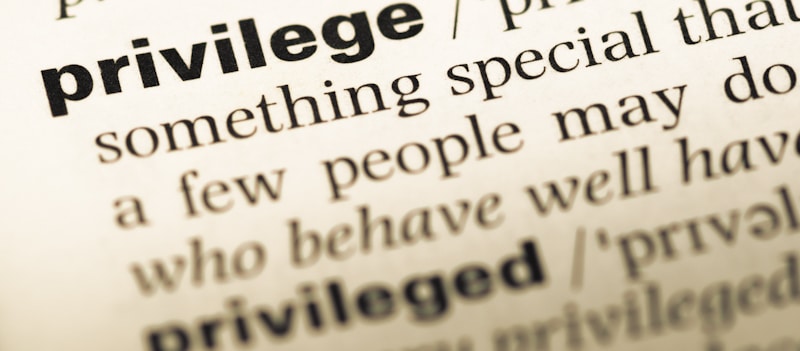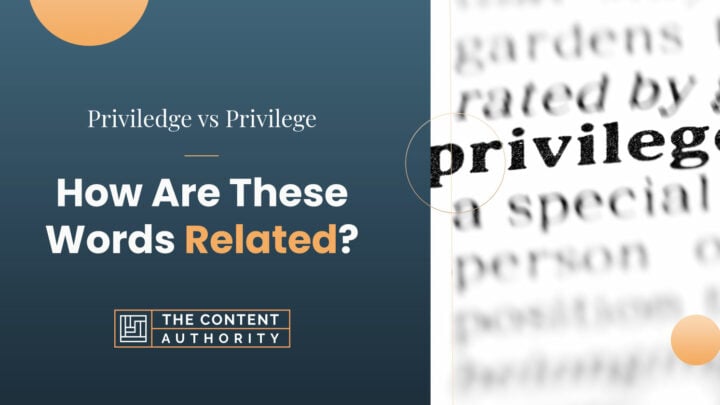Priviledge and privilege are confusing words because they sound the same and have very close spellings. Such attributes about the two words are proof that they are related. A look at the privilegde vs privilege at more profound levels will explain how these words are related.
Privilege means “a specific benefit, favor, right, exemption, or immunity enjoyed by some people but not everyone.” It also means “especially rare or fortunate opportunity.” In contrast, “priviledge” is a misspelling of “privilege.” It was previously accepted, but it is now obsolete.
The variation between the words privilege and priviledge is a single letter. However, even a single letter can cause a significant difference in the English language. Keep it here to learn more about the definitions and usage of these words.

Definitions Of Priviledge And Privilege
The best way to clarify the difference between words is through their definitions. Many sources explain the definitions of words. However, not all of them, especially the sources on the internet, are reliable. Therefore, when looking for definitions, you ought to be keen about the sources you rely on.
That is why we have decided to ease your burden by finding the most accepted definitions of priviledge and privilege. These are meanings from reliable literature and academic sources.
Definitions Of Priviledge
This is an ancient form of “privilege.” While it was once acceptable and considered correct, it is now a misspelling. Ignore this word not to make mistakes you could have avoided.
Definitions Of Privilege
Privilege means “a special advantage or permission that an individual or group gets to the detriment of other people or groups.” A privilege could be an exemption from the law that allows certain individuals or groups to enjoy special rights over others. An example sentence is, “The students would only enjoy the privilege after getting into the fourth grade.”
Another source defines privilege as “a particular benefit, advantage, favor, right, or immunity enjoyed by a specific group or one person but not others.” An example sentence is, “Preferential treatment is a perfect example of a privilege.”
Privilege also means “a rare or fortunate opportunity.” Let us look at an example: “Who entitled the kids to such a privilege?”
As an uncountable noun, privilege means “the fact of enjoying a privilege or being privileged.” It also means “the status or existence of special benefits or advantages within a given society.” An example sentence is, “The family had nothing to say about their privilege until others started benefiting from it.”
In law, a privilege is “a right or immunity enjoyed by a legislative body or the members of a legislative body.” Here is a sentence example: “The members of the society enjoyed the special privilege during their stay at the resort.”
Another legal definition of privilege is “a common law doctrine that shields certain communications from being presented as evidence in a court of law.” For example, “The lawyer honored his client’s privilege by not allowing their private conversations into the courtroom.”
In computing, privilege means “the ability to act on the system that can attain selective permission or access.” An example sentence is, “The system’s privilege is not hard to understand.”
Archaic Definitions of Privilege
These are previously accepted definitions that do not apply in modern contexts:
- Privilege means “to grant someone special rights or exemptions or invest with a peculiar immunity.” For example, “The city council will privilege its representatives from taxation.”
- Privilege means “to bring into a condition of immunity or protection from evil or danger.” For example, “The police had an opportunity to privilege the minister from gunmen.”
How To Properly Use Priviledge And Privilege In A Sentence
Now that you know that priviledge is an archaic spelling and privilege is the correct one, you have an answer to the most burning question about these words. However, this answer does not explain how to use these words to construct sentences. So, here are some practical tips for using priviledge and privilege.
How To Use The Word Priviledge
This word is an obsolete spelling of privilege. For this reason, it is not a correct word and does not exist in any academic dictionary; you should not use it in sentences. Some people still use the word, but it’s because they are not aware of the changes.
For instance, you will hear someone say, “It was a priviledge to share a table with the CEO of the United Nations.” (This sentence is incorrect)
How To Use The Word Privilege
When privilege applies as a noun, it fits in several instances. Some of them include:
- Referring to a particular right or advantage granted exclusively to specific people or groups
- Referring to a right or special immunity given to a corporation, place, or individual
- Referring to an unexpected good fortune, honor, or benefit
- A state of being highly regarded
- A free pass
- A power to make decisions to give orders to others
- A claim to ownership over others
As a verb, use the word in the following contexts:
- To bring into a condition of privilege
- To bestow legal authority
- To bestow official authority
- To grant peculiar exemption
Priviledge vs Privilege: More Differences
The core distinction between these words is their spelling. However, the “edge” and “ege” at the end of the word also influence their pronunciations slightly. For instance, the correct pronunciation for privilege is “/priv-uh-lij/,” while the pronunciation for priviledge is “/priv-uh-lej/.” As simple as the difference may seem, it is quite significant considering that English only has 26 letters, and thousands of words are formed from the same letters.
Something else worth noting about these words is their history. The first known use of the word privilege was in the mid-12th Century. It was first recorded as an Old English word with Latin roots, meaning “grant or commission.” The Old French version of this word is “privilege,” meaning “right or priority,” as translated directly from the Latin “privilegium.” Its archaic spelling was accepted in the early 12th Century.
List Of Examples Of Priviledge And Privilege In Sentences
Privilege is the correct spelling for “special honor, immunity, rights, or advantages enjoyed by a select few.” Now that you know this, you can use these words keenly. Here are examples of sentences featuring the words privilege and priviledge:

Example sentences of the word priviledge
- The family took advantage of their priviledge to the fullest. (INCORRECT)
- The lawyer broke the client-attorney priviledge by disclosing key information that the other lawyers used against his client. (INCORRECT)
- Michael was priviledged to announce his father as the year’s Vanguard Award recipient. (INCORRECT)
- The girls did not understand their priviledge until they no longer had it. (INCORRECT)
- The judge sentenced him to two years of community service for taking advantage of his priviledge and using it unlawfully. (INCORRECT)
Example sentences of the word privilege
- My mum rarely allowed herself that privilege.
- According to the court, there is no handing on of privilege.
- I did not comprehend the intensity of my privilege until my lawyer explained it to me.
- The court deprived the cities of the privilege of deciding whether or not the renovations would continue.
- John failed to understand the gravity of his privilege until he walked a week in the shoes of a less privileged person.
More Great Word Vs Word Posts
Conclusion
Privilege is the right word to use in your various contexts. Correct spelling is a significant component of communication. It helps you express yourself properly and avoid misunderstandings. It also enables you to give off an excellent first impression. The key to mastering proper spelling is constant practice. As the saying goes, “practice makes perfect.”
Shawn Manaher is the founder and CEO of The Content Authority. He’s one part content manager, one part writing ninja organizer, and two parts leader of top content creators. You don’t even want to know what he calls pancakes.

